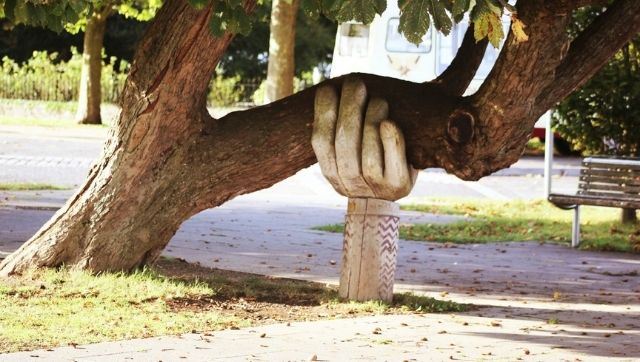Luke 16:1-13
Then Jesus said to the disciples, “There was a rich man who had a manager, and charges were brought to him that this man was squandering his property. So he summoned him and said to him, ‘What is this that I hear about you? Give me an accounting of your management, because you cannot be my manager any longer.’ Then the manager said to himself, ‘What will I do, now that my master is taking the position away from me? I am not strong enough to dig, and I am ashamed to beg.
I have decided what to do so that, when I am dismissed as manager, people may welcome me into their homes.’ So, summoning his master’s debtors one by one, he asked the first, ‘How much do you owe my master?’ He answered, ‘A hundred jugs of olive oil.’ He said to him, ‘Take your bill, sit down quickly, and make it fifty.’ Then he asked another, ‘And how much do you owe?’ He replied, ‘A hundred containers of wheat.’ He said to him, ‘Take your bill and make it eighty.’
And the master commended the unrighteous manager because he had acted wisely; for the children of this age are more prudent in dealing with their own generation than are the children of light. And I tell you, make friends for yourselves by means of unrighteous wealth so that when it is gone, they may welcome you into the eternal homes.
“Whoever is faithful in a very little is faithful also in much; and whoever is dishonest in a very little is dishonest also in much. If then you have not been faithful with the wealth of this world, who will entrust to you the true riches? And if you have not been faithful with what belongs to another, who will give you what is your own? No slave can serve two masters; for a slave will either hate the one and love the other, or be devoted to the one and despise the other. You cannot serve God and wealth.”
Sermon
I want to begin this morning with a short video. The quality isn’t great, but if you’ll bear with it, I think it will help us understand the context of this morning’s parable.
We are persons of incredible privilege. Simply by virtue of living in America, we have the privilege of living lives that are not daily threatened by wars in our backyards or massive famines. Add to that the education that most of us have received, the color of most of our skin, the economic bracket that most of us occupy and we are some of the most privileged people alive today.
Which isn’t to say that we haven’t worked hard to get where we are or that we haven’t experienced prejudices or unfavorable biases—certainly we all have, to greater or lesser degrees. But privilege and hard work, privilege and pain, are not mutually exclusive, and we all experience both.
Privilege has become a buzz word in our culture in the last decade. White privilege, male privilege, Christian privilege, heterosexual privilege, cisgender privilege, these are all terms that have been bandied about with a myriad of consequences, perhaps the most notable of which seem to stem from defensiveness and shame.
It can be hard to hear that we have unearned advantages that others do not—it can take away from our own sense of pride in who we are and what we have accomplished; it can sound like we’ve never faced hardships or that we’ve had everything handed to us on a silver platter when we know that hasn’t been the case. Being made aware of our own privileges can often feel like an accusation, an indictment of our very being, and so perhaps it is not surprising that one popular response has been to deny that such biases and advantages exist. But when we do that, we miss the opportunity that recognizing our privilege gives us. As one author put it, privilege is meant to be a ladder of a word—something we can use to see a bit further, a bit beyond our own experience.
Recognizing the world as a place of privilege, of unjust biases and unearned advantages for some at the expense of others, is key, I think to understanding this morning’s parable.
Turning away from the Pharisees to address the disciples, Jesus tells this story:
“There was once a rich man.”
Now, to be rich in Jesus’ day was to be a landowner. And the rich landowner in Jesus’ parable was rich enough that he had hired a manager, a steward, someone to look after and manage his accounts. Well, news reached the rich man that his manager was squandering his property, so he summoned him and said, give me an accounting of your management because you can no longer be my steward. So the manager, knowing he will no longer be able to find a job as a steward given this bad reputation, and knowing he is not cut out for manual labor or begging, comes up with a plan that will soften his landing once he is fired. He goes to his master’s debtors and, one by one, tells them to quickly sit down and amend their bill so it appears as though they owe less.
Let’s pause here briefly to take stock of the story thus far. We have a rich man, which is never a good thing to be in one of Jesus’ stories, especially in Luke. Luke, you’ll recall began his gospel with Mary’s Magnificat in which God fills the hungry with good things and sends the rich away empty. Luke’s is the gospel in which Jesus begins his ministry by proclaiming his mission as one of “bringing good news to the poor, release to the captives, recovery of sight to the blind, and freedom to the oppressed” (Luke 4:18-19). For Luke, Jesus was all about a redistribution of wealth. So we have a rich man, who we know, because Luke is telling the story, can’t be good, and we have a manager who is engaging in some rather shady dealings right before he is fired. The obvious question is why on earth Jesus is telling this story and who it is exactly that we are meant to emulate. However, lest you were expecting Jesus to clarify, the very next verse only confuses the situation as we hear the master commend the steward for acting wisely.
I mean … what?
I will grant you that the original Greek is unclear about who exactly is praising the steward—if master refers to the rich man or to Jesus, but either way, neither makes a lick of sense. Why would the rich man commend the steward for lowering the amount of money he was to be paid? And why would Jesus commend someone engaged in shady business practices that serve his own self-interest?
Amy-Jill Levine, a Jewish scholar of the New Testament, writes that often parables are designed to tease us into recognizing what we’ve already, always known by reframing our vision. This, I think, is not one of those parables, at least, not on the surface. To make sense of this parable, I think we have to remember three things:
First, the world in Jesus’ day was just as privileged and biased as it is today: the rich man was almost certainly born into his wealth, just as the manager was likely born into the middle class and the poor born into their lot. And the economic system was structured to keep them in those places—with the exception perhaps of the manager who had the opportunity to take a cut of what he collected for the master, which is perhaps why he is fired.
Second, we need to keep in mind the biblical notion of stewardship—this belief that we have been entrusted with gifts (be they wealth, talents, influence, passions, the creation, our children) and it is our job to watch over them. To protect them, yes, but to protect them so that they can be used to further God’s kingdom in our world.
And finally, we need to remember what it is Luke saw as the work of God’s Kingdom—namely, the forgiveness of debts, the release of those held captive, freedom for the oppressed, sight for the blind.
So we have a story in which a middle class man has a position of privilege—he is the steward of both a great amount of wealth as well as the relationships between the rich man and the workers. And, aware that this responsibility is about to come to an end, he chooses not to squeeze those beneath him on the economic ladder, a choice that would have made sense and given him some money on which to survive once he is dismissed, but instead to forgive some of their debts—perhaps the amount he would have normally taken for himself. And yes, his motive appear to be primarily self-serving, but his actions, how he behaves in the world, is as a steward, a steward for God’s kingdom—he uses his privilege to help those who have less—and in the end, perhaps counterintuitively, he is commended (the rich man, after all, will now be seen as exceedingly generous and will reap the benefits of that reputation).
The temptation, I think, is to get caught up in the motivations of the manager and miss the larger message about stewardship and privilege. Much like many of us, the steward finds himself in a position of significant privilege, a position that is soon going to be revoked. He is not the wealthiest guy on the block, not the most privileged, but neither is he the least privileged. He is squarely middle-class. And so the question the parable seems to be asking is: how are to be faithful stewards of the privileges we have been given? And, especially for Luke, how do we do so in light of God’s coming kingdom, when it will be done on earth as it is in heaven?
There were two videos I was debating between showing this morning. The one I didn’t pick was an animated lesson in which a teacher gives each student in the class a scrap piece of paper and tells them to wad it up. The class is arranged in rows of desks and at the front, a few feet away from the first row, is a recycling bin. The goal, the teacher says, is to throw the paper into the recycling bin without getting out of their seats. Immediately the kids in the back rows begin to complain about the unfairness of the situation. And, as expected, most of the students in the front make the shot, though not all, and only a few from the back rows make it.
The teacher agrees that the closer they were to the recycling bin the better the their odds were of making it in, and he explains that this is what privilege looks like. Your job, the teacher concludes, is to be aware of your privilege and to do your best to use it to achieve great things, all the while advocating for those in the rows behind you.
The manager in this morning’s parable is often referred to as the dishonest steward, but that’s not how he is described in the Greek text. He is described as being unjust. But it might be more apt to describe the system in which he operates as unjust. And we too participate, even if unwillingly, in systems of injustice, systems that grant privileges to some and not to others simply by virtue of who they are. But the unjust steward is commended. He’s commended because he uses what he has, even if it is unfairly gotten gains, to help those less fortunate than himself.
No matter how hard we have worked for what we have, and some of us have worked very hard, the Bible continually reminds us that all that we have is a gift from God, a gift that could so easily have been someone else’s if we had been born in a different time or in a different place. The question before us is: how will we steward the gifts and privileges we have been given?
Preached at Covenant Presbyterian Church on September 22, 2019.




